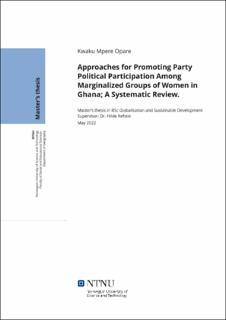| dc.description.abstract | In democratic states, participation in politics is supposed to be inclusive in the sense that every citizen has equal formal rights and opportunities to participate. Statistics and reports have shown that, women in Ghana are the most marginalized groups participating in political party activities in the country. However, little is known about approaches aiming to solve intersecting challenges to promote party political participation among marginalized groups of women. Considering the intersection of social identities responsible for marginalizing women is important because, women do not have homogeneous characteristics and have existing sub-groups among them. How intersecting identities work together among women emanates from intersectional social categories such as age, gender, ethnicity etc. which occurs concurrently. Their experiences differ as a result and requires approaches purposely created for them. Therefore, the study aimed to explore what intersectional challenges of women in party political participation in Ghana is reported, the approach in Ghana towards promoting party political participation among women and the characteristics of these approaches, and how the approaches correspond with the challenges faced by the marginalized women groups and their reported outcomes. Standing for political positions and attending political meetings were the party political activities investigated in this study. Due to the outbreak of the Covid-19 pandemic, data collection from women in Ghana was not possible. A systematic review was therefore seen as the best option to conduct this thesis.
A Preferred Reporting Items for Systematic Reviews and Meta-Analysis (PRISMA), a four phase flow diagram consisting of identification, screening, eligibility and inclusion method was used as a guideline to identify included studies to develop the systematic review. A final selection of 11 studies were retrieved for the systematic review which consist of 4 peer reviewed journal articles, 3 were reports, 2 dissertations or thesis, 1 book and 1website article. A thematic analysis and a narrative form of synthesis was used to present the results of the systematic review. The results indicate that, eight social identities of gender, educational level, age, financial status, religion, ethnicity, disability, and marital status were found to intersect and cause challenges for women participating in party politics. Six approaches namely affirmative action, SNV initiative, legal initiatives, Friends of the Nation (FON) meetings, United Nations Development Programme Initiatives and Organizational Advocacy, Capacity Building and Education were used to promote marginalized groups of women in party politics. Most of the approaches were quite effective in promoting women in standing for political positions and attending political meetings. | |
